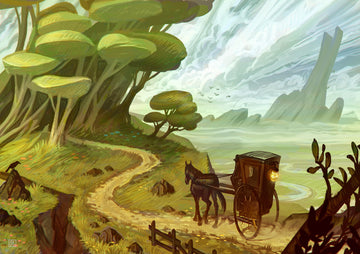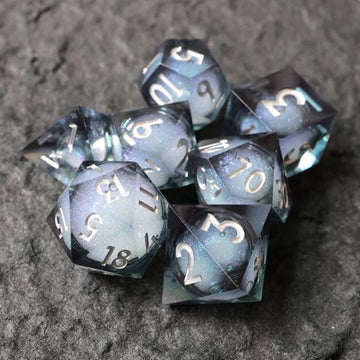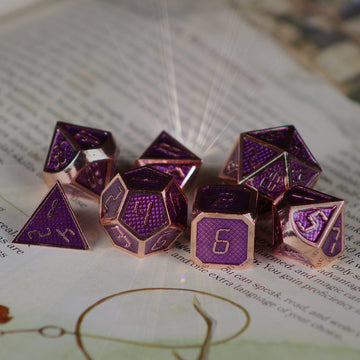Party on the Road? Here Is a "Quick 5e Travel" Guide to Get Them From Point A to Point B... ASAP!
By Riley Rath
Title image © Stephanie Stutz
We've talked A LOT about D&D 5e exploration and travel on this site. And for good reason: both are underrated and underplayed (just like everything else in the exploration pillar). And it's about damn time we started having complete, robust adventures again!
But to avoid confusion, here is how THIS is different than the previous posts I've written:
- To learn about how Wizards of the Coast failed us and the IMPORTANCE of travel in an adventure, read THIS.
- To learn about the 7 DIFFERENT travel methods DMs on the internet suggest, read THIS.
- To learn about the BEST way to run overland travel through the wilderness, read THIS.
THIS post is about traveling along ROADS; DnD fast travel mechanics for when TTRPG players are safely following kings highway. Journeys firmly within civilization that do not touch the true wilds of a fierce, magical world. Trips where the party encounters merchants more than monsters, farms more than forests, and hostels more than hobgoblins.
Table of Contents
- The Need for Quick, Easy, DnD Fast Travel Mechanics
- What Happens When You Take a Road Trip?
- The Purpose of Running These Fast Travel Mechanics
- Failure - "Debilitating Status"
- DnD "Skill Challenge" Travel Method
- DM Prep Work
- Fast Travel "Skill Challenge" Step by Step Process
- How to Make Good Descriptions of the Countryside
- What Makes These Road Travel Rules Great
- Conclusion: Making Travel Feel Rewarding Without Slowing Down the Game

© Tylak71
The Need for Quick, Easy Travel Rules
As I have stated previously, way too many tables skip travel way, WAY too often. The DM gives a brief description of the terrain the party is moving through and BOOM... suddenly they are at the entrance of the forbidden tomb.
This has its place... SOMETIMES... and it sure is simple and easy. But it forgets that travel is an important, often essential part of adventures (want proof? Read this). And to always skip travel is to rob your table of a complete, holistic campaign.
That said, in my attempts to master 5e travel through Awesome Dice blog posts, I have discovered that there is no "one-size-fits-all" method that will always work for every campaign. However, here is always a PROPER travel method that fits for your specific scenario. Every situation has a "fitting" way to play through the travel experience.
And recently I realized that, despite loving my "3 Mechanics for the BEST travel" oh so very much, A) it was ideal for parties moving across the wilderness... B... B) GARBAGE for when the players are walking about an established road:
- You don't need to pick a route when literally everyone takes the main highway.
- You don't need to pick special travel roles when you are sitting in a cart.
- You don't need to make survival checks when you know a tavern is a couple miles down the road.
When there is no difficult terrain, how do you make the journey interesting? Clearly, some other method was necessary.

What Happens When You Take a Road Trip?
So the first thing I did was think through all the various road trips I have taken. What similarities did they share? What was at the heart of traveling along a road for many, many miles? And this is what I came up with:
Change in Landscape: For an hour or so the area may be rolling hills, but eventually that ecosystem fades into farmland, and maybe a few hours later that fades into foothills... so on and so forth. For DND PCs engaging in long distance travel in a cart, those hours would likely be days, but you get the idea; even if they are in the same nation, usually the nature of the terrain changes.
Random Things Stand Out: When you are looking at rolling hills, suddenly a lone blue house feels like a LANDMARK. And if you are driving through a winding, towering canyon, the image of a lone pine tree perched on a rock column is embedded in your memory forever.
You Find Ways to Pass the Time: Whether it is sleeping, reading, listening to music, watching a movie... whatever... most people do not "raw dog" an entire transatlantic flight, they find ways to entertain themselves (if that phrasing shocks you like it did me when I first heard it... here is a blog that explains this new phenomenon).
You See Strange People: I do not know what it is about gas stations that attracts weirdos... but... yeah... they are there! And the more rural you get, the more unique people you are going to find.
Lots of Things to Eat: Rarely does someone on a road trip "forage," cuz anywhere they go would be private property. But also, there is no need to... there are plenty of spots to stop, shop, and snack. So any party really wouldn't need the ranger to do the foraging for them; they could easily refill on rations or just pick berries from the side of the road.
Things Can Go Wrong: When on the road, you are away from your home and routine, in a different land where nothing is familiar. It is very, very easy for things to go wrong. Usually these are small things, like forgetting your sunglasses on the roof of your car at a pit stop. But other times it is more serious, like getting food poisoning or a flat tire.
You Get Tired: I think this is the #1 reason to use these rules rather than skip travel... IT'S TIRING! Aren't you amazed how you can be exhausted from driving in a car all day? Or flying across an ocean in a plane? It's called "travel fatigue," and even if we are sitting there doing nothing, our bodies are yelling at us to lay down and rest. And that's with a cushioned seat; how tiring do you think it would be to walk or ride a horse that distance?!
People Get Cranky: Siblings fight and parents bark at them to settle down. Lovers snap back at each other when they take a wrong turn. Eventually there is "quiet time."
Clearly your party of adventurers traveling across Faerun is experiencing something different from taking a road trip down CA I-5. But I still think it's a good starting point if we want to not skip travel every damn time.

© Tixu66
The Purpose of Mechanics for DnD Road Traveling
But that is real life... now we need to consider DnD fast travel from a NARRATIVE and GAMEPLAY perspective.
Let's start with the narrative side of things, because it is the hardest pill to swallow:
THE RESULTS OF THE JOURNEY WILL NOT CHANGE THE PLOT.
- The party won't meet any NPC with an earth shattering revelation...
- They won't discover a hidden treasure...
- They won't find a secret key they will need later on...
For THIS kind of travel, the destination is way more exciting; the journey is a means to an end.
Once we consider this, we can also conclude that your table would probably riot if one of them died while engaged in some dnd fast travel. And before you say "come on, that won't happen!" ... think about it; all it takes is one bad orc raid and a couple Nat 1's, and suddenly the character that was looking forward to wreaking vengeance upon a vampire is lying in a pool of their own blood.
So much for THAT plot line...
Ok, so from a narrative standpoint, the traveling isn't important. But what about gameplay?
Uh oh... same thing.
Because the cold hard truth is this:
THE PLAYERS ARE GOING TO MAKE IT.
No matter what happens on this road, they are going to get from point A to point B. Not just because the plot demands it, but also because they aren't moving through the land of the black dragon. No, they are moving through the lands of various lords, all of whom are pleased to guard the roads in order to collect tolls. They would have to be beyond incompetent not to survive.
Ok... so both the narrative and gameplay DEMAND the players successfully make the journey, ready for more adventuring. Which begs the question... "why have these fast travel 'skill challenges' at all? If they can't fail, what is the point?"

© Sebastian Gromann
Failure = "Debilitating Status"
True, they WILL get to the other side, but that is not what they are determining...
They are rolling to determine the emotional/mental/physical STATE they finish their journey in.
You see, if they fail the fast travel skill challenge, they don't fail to complete the journey. Instead they arrive in a sub-par condition to continue the adventure. Here is what I mean:
If players fail 50% of the group checks, they each have to select a different "debilitating status" from the below list:
- Physically Tired: the next time your party takes a short rest at the destination, it will not recharge your class abilities.
- Weak Muscles: can only use your modifier for damage on an attack
- Sleep Deprived (lack of focus): you miss an attack roll
- Grumpy (not yourself) DIS on CHA checks (until the DM says so)
- Damaged Material: -1 (or more) to weapon or armor until repaired
- Discouragement: DIS on important saving throw
- Self-Doubt: DIS on important skill check
- "Barely Holding On": Take appropriate levels of exhaustion
These "statuses" cannot be wiped away by a healing spell or long rest. There is nothing they can do once they arrive to resolve this. It makes more sense to imagine them as "un-inspiration die"... something the DM can impose on them whenever they deem it acceptable. And if the players roll bad enough, the DM can make them choose multiple!
And yes... the Dungeon Master decides when they are used. That could be something as innocent as trying to persuade a store owner to give you a better price... or as devastating as missing a crucial attack on a deadly monster. And of course, as a DM, you an add your own/make these far more costly.
Oh... do I suddenly have your attention now?
Does this dnd fast travel skill challenge suddenly have consequences you care about?
Yup... that's the idea :)

© Ralph Horsley
DnD Fast Travel "Skill Challenge"
So I fiddled around and came up with some alternative rules for when players are engaged in long-distance travel along relatively safe roads.
DM Prep Work
First thing's first, you need to get your house in order before you invite players into it. This prep work can be done ahead of time or during a break. I would strongly suggest not doing this while your players sit there and twiddle their thumbs; it will both break the immersion and further reinforce the "boring" stereotype associated with travel.
You'll need to answer these questions to set the stage for the skill challenge. Like I said, you can do this in a couple of minutes once you get used to it:
A) How long is the journey?
B) What is the terrain they are traveling across?
C) What will the weather be? And if it changes, what days will it be bad weather?
D) And given all of that, how often do you think they have to stay in a tavern to avoid CON saves, survival checks, foraging, and exhaustion? One day? Three days? A week?
E) How many encounters do you want? TOA method is roll a d20 for morning, noon, and night, and anything higher than 16 is an encounter. For less encounters, I roll a d10 for the same times of day. If they are passing through a particularly dangerous area, feel free to roll twice for that time/day.
Next is encounters. Now BEFORE you roll on the special encounter table... look at what you've chosen so far. If they have an encounter as they cross a narrow pass, maybe put a bandit ambush there. And if there is a storm while they are passing by a large town, perhaps plan something social in a tavern.
F) After you have assigned some encounters, roll on the random table for each of the remaining random encounters:
- Monster
- Wild animal
- Bandits
- Corrupt law enforcement
- Hunt/forage for food (everyone makes a survival check)
- Interesting NPC
- Natural hazard (canyon, river, etc.)
- Something emotionally distressing
- Food poisoning
- Illness, someone gets sick
- Magical or weapons accident/injury
- Fight breaks out between the party
- Thief steals stuff
- Work/perform for food and shelter
- Experience weird local customs/celebration
- Merchant caravan (buy supplies, replace shit... just costs them money)
- Tavern downtime (pay extra money for tavern experience)
- Need to hide identity (checkpoint, town, etc.)
- Cart breaks/steed injured
- Magical environment/portal
At the end of this process, you should have 90% of what your players will experience, see, and struggle with on this journey.
NOTE: The one aspect that takes more time is the descriptions of the countryside. As a result, scroll down to read a section dedicated to just that.

© Games Workshop
5e Fast Travel "Skill Challenge" Step by Step Process
Ok, so you have it all planned out... time to involve your players:
Step 0 - Explain and Money
Walk them through this skill challenge and the consequences they will face if they fail. If you are tracking money, calculate how much money they will have to spend on food and supplies before they travel. If they plan on staying in taverns as much as possible, you can calculate that now. Or you can wait to charge them once they arrive at each "interval" (see "part D of DM Prep Work").
Step 1 - Describe
Illustrate the areas they are moving through. Make it stand out without going over the top. Imagine yourself on a road trip... what would you see? This is hard, so for more guidance, scroll down to the section titled "Narration Tips for Vivid Descriptions of the Countryside."
Step 2 - Group Skill Check Per Encounter
This is the meat and potatoes of this method. You describe the encounter they are going to face.
As already stated, you KNOW and they KNOW they are going to succeed, so there is no reason to spend hours following the RAW.
Instead, have each of them propose a skill they would use to help resolve the situation:
- If they can justify the skill to the DM, they can use it
- Each player then rolls their said skill
- If more than 50% of the group succeeds their skill of choice, then he encounter is deemed a "success."
Now you might be wondering: "Do you still do this for combat encounters?" and the answer is a resounding YES! For combat encounters, you can have them just roll a single attack roll... or athletics/arcana check (here is something similar). Whatever you choose, just have them describe all the cool/cinematic stuff they do during the fight. And if they fail, have them describe the types of injuries they sustain or why they fail, etc.
Of course, if the players WANT to role-play the encounter, or WANT to play the combat, by all means allow them! You can wash your hands knowing you are absolved of guilt for any consequences they may face!
Step 3 - Survival Checks (if necessary)
This is why "part D" of the DM prep was important. If players want to save money on a tavern, then they need to instead camp out. In the summer, this is probably no big deal. They go to sleep 7 nights under the stars and feel fine. But in the winter? One or two nights outdoors might be all they can do before suffering some detrimental effects.
So, as a DM, it's your job to determine how many nights they can go before they NEED to stay in a tavern. If they do not stay in a tavern, then they make the following group checks:
- CON save (persevere)
- INT save (not get lost)
- Perception check (watch for threats)
- Survival check (shelter, food, water)
- Athletics check (IF they are crossing difficult terrain)
These are still group checks, and they are still pass/fail, but I would impose an IMMEDIATE consequence if they fail: one level of exhaustion. And the only way to get rid of it is to stay in a tavern and get a good night's sleep in a warm bed.
Step 4 - Downtime (optional)
If the encounters are spaced apart by a day or so, have them role-play some downtime. If a player wants to talk to another character really bad, allow them. But if you get no volunteers, randomly choose two players to chat about something at some random location (fire, road, tavern, foraging, etc.) Also ask if they are doing anything to train, learn, or just entertain themselves and everyone else!
Step 5 - Repeat the Steps Until Journey's End!

Narration Tips for Vivid Descriptions of the Countryside
This will be a full blog post later on, but since so much of this travel method relies on quality descriptions of the player characters' surroundings, it deserves some attention. Because in order to make this travel engaging and FEEL like travel, you need the descriptions of the lands they pass through to be evocative; to paint a vivid picture in their heads. But while describing a magnificent magical city in the clouds is easy... describing identical towns, farms, and woods over and over again can get boring quick.
So how do you do that when they are moving across plains for 10 days?
- 1) Have something that everything in the area shares. Could be the type of farms or species of trees in a forest, the mountains in the background, or the snow on the ground. Always include this somewhere in your description.
- 2) Describe how the characters PHYSICALLY feel. They might feel a certain way based on a previous encounter. Or maybe it is summer and they are sweating. Or the road is muddy from rain and their shoes are squishing and squashing.
- 3) From this general area, pick the feature that is more prominent about this particular area they are moving through. Everywhere might have woods, but THESE trees are particularly tall. And everywhere has peasant farmers, but THESE peasants' homes seem particularly cozy and quaint.
- 4) Incorporate landmarks and points of interest. Take that last example. You've pointed out that the peasants' homes are really cute in this area... now describe in detail ONE house that stands out among the others. Give it a unique, wonderful, and/or odd appearance. Or it can be a natural landmark, like a rock formation that looks like a man in a chair, or the spires of a cathedral shining in the sunlight of a far off town.
- 5) Name a tasty (or yucky) food or drink they experience in-between encounters. Or don't. Or make the players make stuff up. Up to you. But I think it's pretty fun :)
- 6) Articulate how the characters feel EMOTIONALLY. Take everything you have said into consideration and summarize the description with their general emotional state at this point in the journey.
Like I said, you'll be doing this in between most encounters... in a dnd campaign, you always have to refresh the image in your players' heads.

© Andrey Osadchikh
What Makes These Dungeons and Dragons Travel Rules Great
- Narrative-Driven Campaign: First and foremost, DnD fast travel allows GMs to skip repetitive and uneventful parts of the journey, allowing the the players' focus to be on the more important story elements.
- Cover Lots of Ground Really Fast: If you played this the way RAW claim, you would be on the road for multiple sessions. With this method, you can cross an entire country in 15-45 minutes.
- Player-Driven: You pick the encounters, but players decide how they approach them.
- Meaningful Decision Making: Since the consequences of their actions shave some stakes that impact the adventure, players will feel engaged and take it seriously.
- Still Fun/Funny: But not TOO seriously... they still allow for cinematic moments and silly brevity.
- Doesn't Impact Any Existing Spells or Mechanics: Things like Water Walk and flying speed and teleportation aren't impacted. And if they want to increase their movement speed, you can just the travel pace rules on page 182 of the original Player's Handbook.
- Players Feel the Passage of Time: Most importantly, these mechanics still accomplish the most important thing: the FEELING of travel. Players will intuitively grasp that time has passed and that their characters have traversed the landscape.
"How Is This Different Than a Hex Crawl?"
Hex crawls are all about EXPLORATION. You are discovering what is out there and forging your own path. These rules are for when players do NOT want to take tangents, there is not much to discover, and they are following an established road.

By VrenchVry for Foxyoldseph
Conclusion: Making Travel Feel Rewarding Without Slowing Down the Game
Sometimes when your players are traveling from here to there, you KNOW they are going to arrive safe and sound. The plot is too fun, and the terrain they are traversing isn't threatening enough to warrant playing out every... single... encounter.
However, this method provides an alternative to just skipping travel altogether. It allows players to FEEL the sense of a journey, identify a few distinct moments, and make decisions that can create a meaningful impact when it matters most.
Is it as fast as teleporting at higher levels? No... but it's a lot faster than having them roll for night watchers every single time they make camp!
Want a Free PDF of Our Fast Travel Skill Challenge?
Click here
Riley Rath

Riley is a freelance copywriter, content writer, and marketer based out of Spokane, WA. He is thankful to have the opportunity to combine his passion for imaginative role-playing to help FLGS, tabletop, board game, and D&D related businesses communicate their distinct value to players everywhere. When not playing or writing about board games or DnD, he is busy hiking, cooking, and gardening... very hobbit-like for a 6'4" dude.
Use this link if you are interested in his TTRPG and board game marketing assistance!










